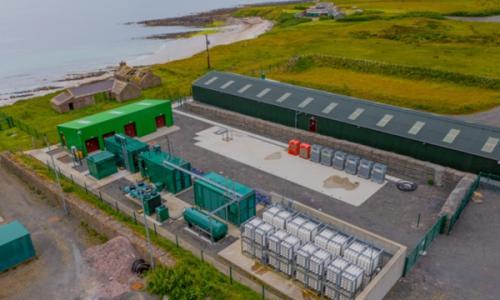6月28日讯联合国秘书长安东尼奥*古特雷斯发表题为《世界正在燃烧我们需要一场可再生能源革命》的文章,全文如下:
“为了保障能源安全、获得稳定的电价、实现繁荣、使地球宜居,唯一正确的途径就是放弃污染环境的化石燃料,加速转向可再生能源。”
传说尼禄在大火吞没罗马时却在拉提琴取乐。如今一些领导人的行为更糟糕,他们在火上浇油。此话毫不夸张,因为随着俄罗斯入侵乌克兰的影响波及全球、能源危机日益严重,一些国家的反应是对化石燃料加倍投资,在煤炭、石油、天然气产业投入数十亿美元,而这些燃料正是加剧气候危机的罪魁祸首。
与此同时,所有气候指标都不断打破纪录,预示未来地球大片地区将出现猛烈的暴风雨、洪水、干旱、山火、难耐的高温。世界正面临着气候乱象。把更多资金投入到化石燃料勘探及生产设施是执迷不悟之举。化石燃料不是解决问题的答案,也永远不会是。人类对地球及社会造成的破坏有目共睹,每天都有相关的新闻,且无人能免受其害。
化石燃料是造成气候危机的原因,解决问题的答案是可再生能源,因为它能限制对气候的破坏,还能增强能源安全。人类以前如果对可再生能源进行了大规模投资,就不至于现在又因化石燃料市场不稳而受害。转向可再生能源是通往21世纪和平之途。然而,在实现快速公正的能源转型这场战役中,实力倾向于抵抗的一方。投资者仍在向化石燃料投资,政府仍在为煤炭、石油、天然气产业送去数以十亿计美元的补贴,约等于每分钟补贴1 100万美元。
有一个形容“只解眼前急、不为长远计”的词:上瘾。人类仍对化石燃料有瘾。为了社会与地球的健康,必须戒除这个瘾,且要立竿见影。为了保障能源安全、获得稳定的电价、实现繁荣、使地球宜居,唯一正确的途径是放弃污染环境的化石燃料,加速转向可再生能源。
为此,我已呼吁20国集团国家的政府拆除煤炭基础设施,其中经合组织国家到2030年应完全淘汰此类设施,其他国家到2040年应完全淘汰此类设施。我也已敦促金融机构放弃化石燃料融资,转而投资于可再生能源。我还提出了一项在世界各地促进可再生能源的五点计划。
第一,必须使可再生能源技术成为全球公益物,包括为此消除技术转让方面的知识产权障碍。
第二,必须使全球可再生能源的技术部件供应链、原材料供应链更加畅通无阻。
2020年全球安装了5吉瓦的电池储能系统。到2030年,我们需要600吉瓦的电池储能容量。显然,需要全球大力协作才能实现这一目标。当前运输受阻、供应链受限、锂等电池用金属成本升高,妨碍了这方面技术及材料的应用,而此时我们最需要这些技术及材料。
第三,必须减少阻碍太阳能项目、风能项目的审批关卡。需要采纳快速审批办法,同时加快电网现代化。欧盟批准一个风力发电场项目需要8年,美国需要10年。大韩民国的陆上风能项目需要8个不同部委发给22个许可证。
第四,各国必须将用于化石燃料的能源补贴转用于保护弱势群体免遭能源冲击损害,同时用于为公正过渡到可持续的未来而投资。
第五,必须将可再生能源投资增加两倍。相关行为方包括多边开发银行、发展筹资机构,也包括商业银行。各方都必须加快步伐,大幅增加对可再生能源的投资。
全球所有领导人都必须更有紧迫感。科学已证明,将气温升幅限制在1.5摄氏度的极限以下才能避免最恶劣的气候影响,而人类已接近这个悬崖的边缘了。为了能保持在1.5摄氏度这个极限以下,到2030年必须将排放量减少45%,到本世纪中叶必须实现净零排放。然而以目前各国所作承诺计算,排放量在本十年内将增加近14%。这将带来一场灾难。
如何实施气候行动?如何保障能源安全?如何为目前缺乏清洁电力的数亿人提供清洁电力?答案在于可再生能源。转向可再生能源将一举三得。
任何人都没有理由反对可再生能源革命。正当石油和天然气价格空前高涨之时,可再生能源的价格一路下降。太阳能和电池的成本十年来已下降85%,风力发电的成本下降了55%。可再生能源投资创造的就业机会是化石燃料投资的三倍。
当然,可再生能源并非应对气候危机的唯一办法。基于自然的办法,如扭转砍伐森林、土地退化的趋势,也必不可少。提高能效也是一个重要途径。同时我们必须有雄心快速转向可再生能源。
人类逐渐摆脱对化石燃料的依赖将带来巨大效益,且不仅是对气候而言。能源价格将更低廉、更可预测,从而对粮食安全及经济安全产生积极的连锁效应。能源价格上涨会使食品及人类依赖的所有商品都涨价。因此,让我们一致认识到快速开展可再生能源革命势在必行,而绝不逍遥地看着人类的未来被烈焰吞没。
以下为英文全文:
THE WORLD IS BURNING. WE NEED A RENEWABLES REVOLUTION.
The only true path to energy security, stable power prices, prosperity and a livable planet lies in abandoning polluting fossil fuels and accelerating the renewables-based energy transition.
By António Guterres, Secretary-General of the United Nations
Nero was famously accused of fiddling while Rome burned. Today, some leaders are doing worse. They are throwing fuel on the fire. Literally. As the fallout of Russia’s invasion of Ukraine ripples across the globe, the response of some nations to the growing energy crisis has been to double down on fossil fuels – pouring billions more dollars into the coal, oil and gas that are driving our deepening climate emergency.
Meanwhile all climate indicators continue to break records, forecasting a future of ferocious storms, floods, droughts, wildfires and unlivable temperatures in vast swathes of the planet. Our world faces climate chaos. New funding for fossil fuel exploration and production infrastructure is delusional. Fossil fuels are not the answer, nor will they ever be. We can see the damage we are doing to the planet and our societies. It is in the news every day, and no one is immune.
Fossil fuels are the cause of the climate crisis. Renewable energy is the answer – to limit climate disruption and boost energy security. Had we invested earlier and massively in renewable energy, we would not find ourselves once again at the mercy of unstable fossil fuel markets. Renewables are the peace plan of the 21st century. But the battle for a rapid and just energy transition is not being fought on a level field. Investors are still backing fossil fuels, and governments still hand out billions in subsidies for coal, oil and gas – some US $11 million every minute.
There is a word for favouring short-term relief over long-term well-being. Addiction. We are still addicted to fossil fuels. For the health of our societies and planet, we need to quit. Now. The only true path to energy security, stable power prices, prosperity and a livable planet lies in abandoning polluting fossil fuels and accelerating the renewables-based energy transition.
To that end, I have called on G20 governments to dismantle coal infrastructure, with a full phase-out by 2030 for OECD countries and 2040 for all others. I have urged financial actors to abandon fossil fuel finance and invest in renewable energy. And I have proposed a five-point plan to boost renewable energy round the world.
First, we must make renewable energy technology a global public good, including removing intellectual property barriers to technology transfer. Second, we must improve global access to supply chains for renewable energy technologies components and raw materials.
In 2020, the world installed 5 gigawatts of battery storage. We need 600 gigawatts of storage capacity by 2030. Clearly, we need a global coalition to get there. Shipping bottlenecks and supply-chain constraints, as well as higher costs for lithium and other battery metals, are hurting deployment of such technologies and materials just as we need them most.
Third, we must cut the red tape that holds up solar and wind projects. We need fast-track approvals and more effort to modernize electricity grids. In the European Union, it takes eight years to approve a wind farm, and 10 years in the United States. In the Republic of Korea, onshore wind projects need 22 permits from eight different ministries.
Fourth, the world must shift energy subsidies from fossil fuels to protect vulnerable people from energy shocks and invest in a just transition to sustainable future.
And fifth, we need to triple investments in renewables. This includes multilateral development banks and development finance institutions, as well as commercial banks. All must step up and dramatically boost investments in renewables.
We need more urgency from all global leaders. We are already perilously close to hitting the 1.5°C limit that science tells us is the maximum level of warming to avoid the worst climate impacts. To keep 1.5 alive, we must reduce emissions by 45 per cent by 2030 and reach net zero emissions by mid-century. But current national commitments will lead to an increase of almost 14 per cent this decade. That spells catastrophe.
The answer lies in renewables – for climate action, for energy security, and for providing clean electricity to the hundreds of millions of people who currently lack it. Renewables are a triple win.
There is no excuse for anyone to reject a renewables revolution. While oil and gas prices have reached record price levels, renewables are getting cheaper all the time. The cost of solar energy and batteries has plummeted 85 per cent over the past decade. The cost of wind power fell by 55 per cent. And investment in renewables creates three times more jobs than fossil fuels.
Of course, renewables are not the only answer to the climate crisis. Nature-based solutions, such as reversing deforestation and land degradation, are essential. So too are efforts to promote energy efficiency. But a rapid renewable energy transition must be our ambition.
As we wean ourselves off fossil fuels, the benefits will be vast, and not just to the climate. Energy prices will be lower and more predictable, with positive knock-on effects for food and economic security. When energy prices rise, so do the costs of food and all the goods we rely on. So, let us all agree that a rapid renewables revolution is necessary and stop fiddling while our future burns.















 扫一扫关注微信
扫一扫关注微信